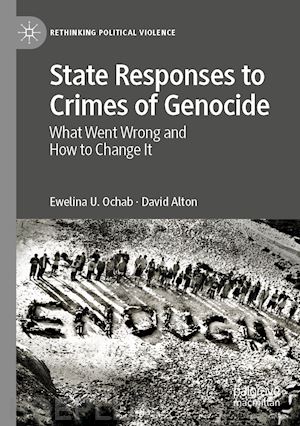
Questo prodotto usufruisce delle SPEDIZIONI GRATIS
selezionando l'opzione Corriere Veloce in fase di ordine.
Pagabile anche con Carta della cultura giovani e del merito, 18App Bonus Cultura e Carta del Docente
At the time of drafting the UN Convention on the Prevention and Punishment of the Crime of Genocide (Genocide Convention), the drafters were hopeful that the document will be the response needed to ensure that the world would never again witness such atrocities as committed by the Nazi regime. While, arguably, there has been no such great loss of human lives as during WWII, genocidal incidents have and still take place. After WWII, we have witnessed the genocides in Cambodia, Rwanda, Bosnia, Darfur, to name only a few. The responses to these atrocities have always been inadequate. Every time the world leaders would come together to renew their promise of ‘Never Again’. However, the promise has never materialised. In 2014, Daesh unleashed genocide against religious minorities in Syria and Iraq. Before the world managed to shake off from the atrocities, in 2016, the Burmese military launched a genocidal campaign against the Rohingya Muslims in Myanmar. This was followed by reports ofever-growing atrocities against Christian minorities in Nigeria. Without waiting too long, in 2018, China proceeded with its genocidal campaign against the Uyghur Muslims. In 2020, the Tigrayans became the victims of ethnic targeting. Five cases of mass atrocities that, in the space of just five years, all easily meet the legal definition of genocide. Again, the response that followed each case has been inadequate and unable to make a difference to the targeted communities. This legacy does not give much hope for the future. The question that this books hopes to address is what needs to change to ensure that we are better equipped to address genocide and prevent the crime in the future.
Ewelina U. Ochab is a lawyer, human rights advocate, author and co-founder of the Coalition for Genocide Response, and gained her PhD in International Law, Medical Law, and Medical Ethics from Kent Law School, UK.
David Alton, (Lord Alton of Liverpool) was a Member of the House of Commons for 18 years and in 1997 he was appointed a Life Peer. In 2021, he piloted the Genocide Amendment to the Trade Act through the UK Parliament. In 1997, he was appointed Professor of Citizenship at Liverpool John Moores University, UK, and in 2017 he was appointed as a Visiting Professor at Liverpool Hope University, UK.











Il sito utilizza cookie ed altri strumenti di tracciamento che raccolgono informazioni dal dispositivo dell’utente. Oltre ai cookie tecnici ed analitici aggregati, strettamente necessari per il funzionamento di questo sito web, previo consenso dell’utente possono essere installati cookie di profilazione e marketing e cookie dei social media. Cliccando su “Accetto tutti i cookie” saranno attivate tutte le categorie di cookie. Per accettare solo deterninate categorie di cookie, cliccare invece su “Impostazioni cookie”. Chiudendo il banner o continuando a navigare saranno installati solo cookie tecnici. Per maggiori dettagli, consultare la Cookie Policy.